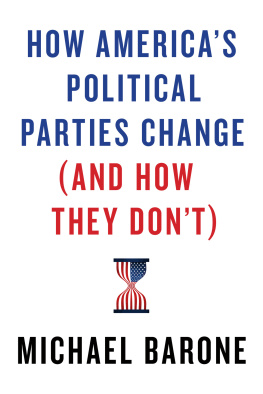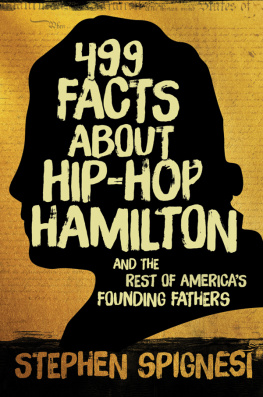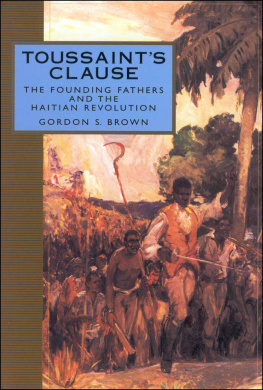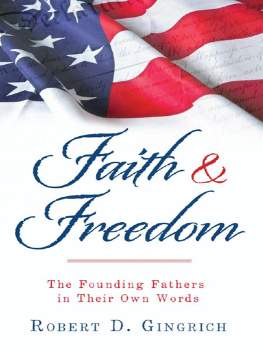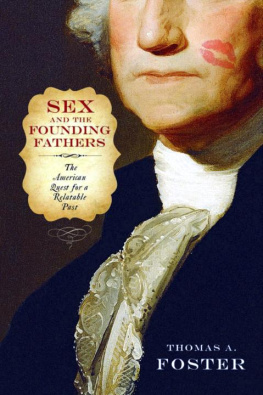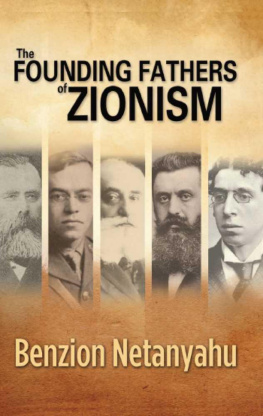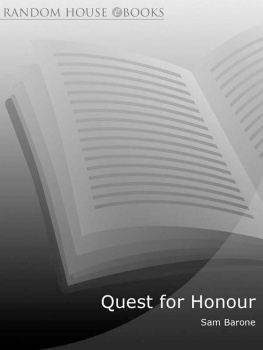Michael Barone - Our first revolution: the remarkable British uprising that inspired Americas founding fathers
Here you can read online Michael Barone - Our first revolution: the remarkable British uprising that inspired Americas founding fathers full text of the book (entire story) in english for free. Download pdf and epub, get meaning, cover and reviews about this ebook. year: 2008, publisher: Three Rivers Press, genre: Politics. Description of the work, (preface) as well as reviews are available. Best literature library LitArk.com created for fans of good reading and offers a wide selection of genres:
Romance novel
Science fiction
Adventure
Detective
Science
History
Home and family
Prose
Art
Politics
Computer
Non-fiction
Religion
Business
Children
Humor
Choose a favorite category and find really read worthwhile books. Enjoy immersion in the world of imagination, feel the emotions of the characters or learn something new for yourself, make an fascinating discovery.

- Book:Our first revolution: the remarkable British uprising that inspired Americas founding fathers
- Author:
- Publisher:Three Rivers Press
- Genre:
- Year:2008
- Rating:4 / 5
- Favourites:Add to favourites
- Your mark:
- 80
- 1
- 2
- 3
- 4
- 5
Our first revolution: the remarkable British uprising that inspired Americas founding fathers: summary, description and annotation
We offer to read an annotation, description, summary or preface (depends on what the author of the book "Our first revolution: the remarkable British uprising that inspired Americas founding fathers" wrote himself). If you haven't found the necessary information about the book — write in the comments, we will try to find it.
Michael Barone: author's other books
Who wrote Our first revolution: the remarkable British uprising that inspired Americas founding fathers? Find out the surname, the name of the author of the book and a list of all author's works by series.
Our first revolution: the remarkable British uprising that inspired Americas founding fathers — read online for free the complete book (whole text) full work
Below is the text of the book, divided by pages. System saving the place of the last page read, allows you to conveniently read the book "Our first revolution: the remarkable British uprising that inspired Americas founding fathers" online for free, without having to search again every time where you left off. Put a bookmark, and you can go to the page where you finished reading at any time.
Font size:
Interval:
Bookmark:
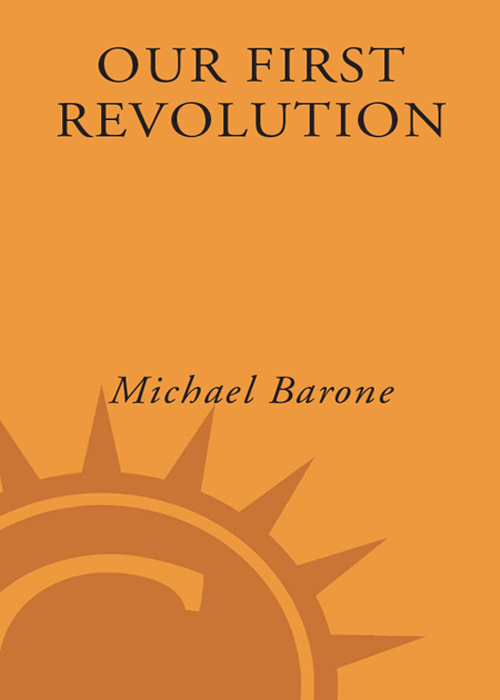
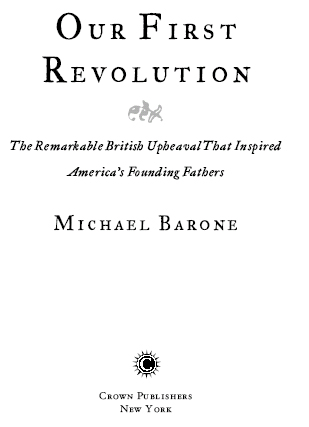
Contents

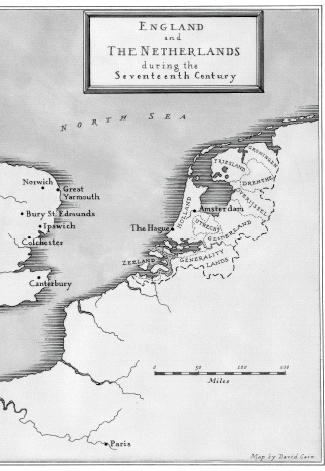
Authors Note
During the seventeenth century, England and some parts of the Netherlands used the Old Style calendar, while almost all of Europe used the New Style calendar. That meant that dates were ten days earlier in England than on the Continent. Here dates of events in the British Isles are given in Old Style, those of events on the Continent in New Style. Where it may be helpful to avoid confusion, both dates are given.
Chapter 1

T HE I MPROBABLE R EVOLUTION
T HE F IRST R EVOLUTION: what is generally known as the Glorious Revolution. In recent years Americans have been devouring books on our nations Founding FathersBenjamin Franklin, George Washington, John Adams, Thomas Jefferson, Alexander Hamiltonsome written by academic historians, others by gifted professional writers. As these writers help us understand, the Founders did not spring from a historical vacuum. Before the break with the Crown, they regarded themselves as Englishmen, as inheritors of the system of government and the traditional liberties of England. As they moved daringly into a revolutionary and republican future, they looked back on a heritage that was shaped by many historical events. Not least among them was what most Englishmen referred to as the Glorious Revolution of 168889. This term referred to the series of events that resulted in the ouster of King James II and the installation of King William III and Queen Mary II, and in changes in English law, governance, and politics that turned out to be major advances for representative government, guaranteeing liberties, global capitalism, and a foreign policy of opposing hegemonic powers on the European continent and in the world beyond.
The First Revolution, as it will be called here, was a reference point, an example, indeed a glowing example, for the American Founders. The Founding Fathers began their rebellion not by rejecting the achievements of the Glorious Revolution, but by arguing that Parliament and King George III were denying them their rights as Englishmen that were gained in that Revolution and the revolutionary settlementthe laws passed in 1689 and the 1690s. It is true that as the Founding Fathers created their own revolution and formed their republic, they did not fully accept the Revolutionary settlementthe set of laws and customs established during and immediately following the Glorious Revolution. The new nation would have no monarchy or titled nobility, no religious tests for public office, and no national established church. But the founders also self-consciously copied some features of the Revolutionary settlement, from yearly sessions of Congress to the establishment of a national bank and a funded debt to the Second Amendment right to bear arms.
The Glorious Revolution has long been recognized in Britain as a founding event that has shaped the character of the nation ever since. But this First Revolution has gotten much less attention in the United States. For much of the second half of the twentieth century, academic historians in this country as well as in Britain have devoted much more attention to the events of 164160, events that brought to the fore radicals who could be seen as ancestors of the Marxist revolutionaries of the twentieth century. The Glorious Revolution was seen, in contrast, as something in the nature of a coup dtat brought off by royals and nobles, a shuffling of power between dead white males (never mind that important parts were played by Princesses Mary and Anne, Queen Mary Beatrice, and Sarah Churchill). But there is a strong argument that the events of 164160 were less than consequential in shaping the English polity and what would become the American inheritance than was the Revolution of 168889 and the Revolutionary settlement that was worked out in the 1690s. Those changes proved to be far more enduring.
The Revolution of 168889 was the first change of government in England that was at the time called a revolution. Twentieth-century historians often refer to the events of 164160 as the English Revolution,1 but this complicated series of eventsdescribed by recent historians as three separate civil wars and a republican interregnumwas not called a revolution in the seventeenth century.2 In contrast, the events of 168889 were the first to be widely, almost universally, labeled a revolution by contemporaries.3
The First Revolution was a tremendously consequential event and a tremendously improbable one. I cannot forbear remarking, wrote the Cumberland landowner and regional political magnate Sir John Lowther in his Memoirs of the Reign of James II, how wonderfullie this thing succeeded in opposition to so many visible and apparent accidents, anie one of which whereof they had happened, the whole design must certainly have miscarried.4 It was, writes historian J. G. A. Pocock, an amazing and unpredicted transaction,5 or, as the historian Paul Rahe writes, it was by no means inevitable. It more nearly resembled a freak accident.6 William of Orange, stadholder of the Netherlands, assembled an army variously estimated at 15,000 to 20,000 men and a flotilla of five hundred ships, crossed the English Channel in the usually wind-tossed month of November, then pushed James II to order his army to retreat without a battle. Princess Mary, Williams wife, and Princess Anne cooperated in the ouster of their father, James II. It was, as Pocock continues, a spectacular display of reason of state rising above the restraints of common morality; daughters dethroned their father, even the sanitized version of King Lear was hard to perform for many years, and what William of Orange and John Churchill severally did is still enough to take your breath away if you think about it.7 Or, as the Calvinist and usually humorless William said to the Anglican clergyman Gilbert Burnet after his troops successfully landed in England, Well, Doctor, what do you think of predestination now?8
The First Revolution happened in an England and a Europe very different from todays. This mostly bloodless revolution occurred after more than a century of religious wars. In England, Henry VIII broke with the Catholic Church when denied a divorce, and in 1532 was declared the Supreme Head of the Church of England. Under Henry and his young successor Edward VI, the Church of England adopted many Protestant doctrines: the king was the Supreme Head of the Church, monasteries were closed, English translations of the Bible and an English Prayer Book were introduced.9 Edward died at 16 and was succeeded in 1553 by his older sister Mary I, who returned England to Catholicism and executed some 300 Protestants. She died in 1558 and her Protestant sister Elizabeth I reestablished the Church of England.
Despite the established Church of England, many forms of belief persisted under Elizabeth and her successor James I (160325). There were Puritans, a loosely defined group who wanted to simplify Church ritual and belief, and Presbyterians, who believed that the Church should be governed by elders selected by congregations rather than by bishops selected by the king. There were, living secretly and also in the open, Catholics who remained loyal to the Church of Rome. Religious differences played an important role in the Civil War that broke out between Charles I and Parliament in 1642 and that resulted in the execution of the king in 1649. The parliamentary governments led by Oliver Cromwell and others banned Church of England clergy from preaching, ordered Catholic priests out of the kingdom, and stripped churches of ornament and paintings and broke stained-glass windows. When Charles II was restored to the throne in 1660, the Church of England was again established. But in the years since Charles I was executed, there had grown up Dissenting Protestant sects that would in time be known as Presbyterians, Congregationalists, Baptists, and Quakers. The treatment of these Dissenting Protestants and of Catholics became lively political issues in Charles IIs reign and that of his brother James II (168588). 10
Next pageFont size:
Interval:
Bookmark:
Similar books «Our first revolution: the remarkable British uprising that inspired Americas founding fathers»
Look at similar books to Our first revolution: the remarkable British uprising that inspired Americas founding fathers. We have selected literature similar in name and meaning in the hope of providing readers with more options to find new, interesting, not yet read works.
Discussion, reviews of the book Our first revolution: the remarkable British uprising that inspired Americas founding fathers and just readers' own opinions. Leave your comments, write what you think about the work, its meaning or the main characters. Specify what exactly you liked and what you didn't like, and why you think so.

